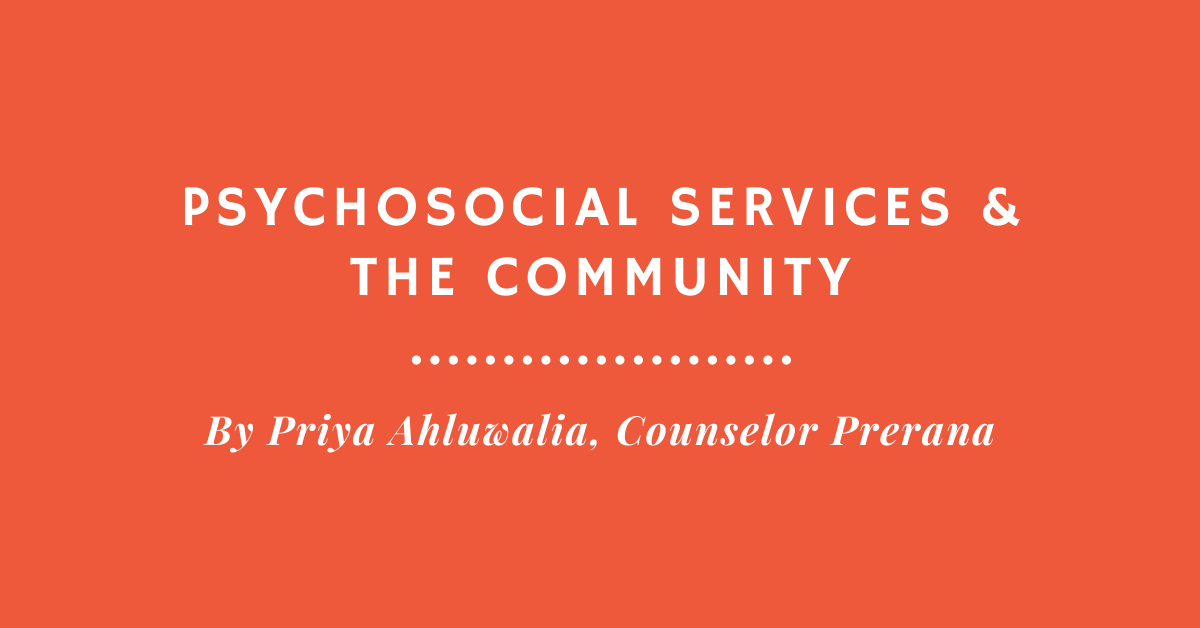
Using the term ‘Survivor’: Facilitating conceptual clarity in the anti-trafficking domain
Pravin Patkar
CO-FOUNDER AND DIRECTOR, Prerana
The context
Over the past decade, we have come across an increased use of the term survivors to refer to victims of trafficking. Various platforms, organizations, institutions, individuals use the term ‘Survivor’ widely differently and there has been little effort to put these usages in a comparative and analytical perspective for better understanding. We have not come across any serious analytical essay on the use of the term which implies a possibility that the use may be more a product of being fashionable than conceptually accurate. To date, no UN agency has defined the term neither conceptually nor operationally. Neither has the global anti-trafficking program of the US government or any other INGO defined the term survivor. The term Survivor is particularly used in replacement of the term Victim, which has been clearly defined in the Indian and international contexts.
Legally speaking
Section 2(wa) of India’s The Code of Criminal Procedure- 1973 (CrPC), defines Victim as follows;
“Victim” means a person who has suffered any loss or injury caused by reason of the act or omission for which the accused person has been charged and the expression “victim” includes his or her guardian or legal heir.
The term Victim has been defined in the UN Declaration of Basic Principles of Justice for Victims of Crime and Abuse of Power 1985.
Unfounded preferences
Some groups champion the use of the term ‘Survivor’ in place of the term ‘Victim’ saying that the term victim implies that the person subjected to the incident (loss, injury or harm of crime or unfair treatment) is permanently weak and incapable of overcoming the debilitating consequences of the incident. However, there is no evidence in support of this presumption.
Although there are no analytical essays or reports of empirical research studies on the use of the term Survivor the term is sometimes found to be used quite loosely in guidelines and such other documents issued by both the Govt. and voluntary organizations. One closest example is the guideline namely “GUIDELINES & PROTOCOLS: Medico-legal care for survivors/victims of Sexual Violence (2014)” released by the Ministry of Health and Family Welfare, Govt. of India.
The document does not provide the much-needed conceptual clarity or theorization of the term ‘survivor’. The use of the term is only incidental and carries no significance in the text of the guidelines. The terms are not defined anywhere in the document. It is described in the Glossary section of the booklet as follows;
Survivor: The Guidelines and proforma use the term survivor. The term survivor recognizes that the person has agency and she is capable of taking decisions despite being victimized, humiliated, and traumatized due to the assault. Use of the term survivor by all those providing services recognizes these efforts and encourages them to believe the person and not pity her, whereas the term “victim” is understood as a person who doesn’t possess agency and is not fully capable of comprehending the situation at hand because of the victimhood faced.
Victims: The term “victim” literally means a person suffering harm including those who are subjected to non-consensual sexual acts which could be sexual assault, rape, or sexual violence. It also means a person is in need of compassion, care, validation, and support.
As one can see the description is less about what the term means or implies and more about why it should be used in place of the term victim, a justification rather than a definition.
While defining the term Victims it fails to take cognizance of the fact that the term Victim has been formally and clearly defined in the CrPC long ago and its meaning is well established and that the GoI has to follow that definition rather than go by a loose and different description/ definition provided in the above Guidelines.
Redundant dichotomy
The distinction between the two terms namely victim and survivor, given in the glossary does not lead to a differential treatment to be given to the two categories and raises a question as to ‘Why has the distinction been made in the first place?’ The further chapters of the Guidelines are not serious about maintaining the distinction between the two terms or offering different guidelines using the terms. The ‘Introduction’ chapter mentions the two terms Survivors/ Victims but subsequent chapters drop the term ‘victim’ completely. Further on, the chapters drop using both the terms and instead use the term ‘person’.
As one looks at the description/ definition of the term ‘victim’ one can see that it is a classic case of the logical flaw of first defining a term arbitrarily and conveniently so that it can then be criticized thoroughly. The term victim is unnecessarily described as derogatory. The presumption is not substantiated. It presumes that there are two types of persons who are subjected to an offense, some with agency (called the survivors) and the others without agency (called the victims). It unreasonably believes that people pity a person when they call her a victim.
The common usage of the term victim actually shows that a person can be a ‘victim’ of crime, mismanagement, vagaries of nature, inconvenience of using a public facility like a toilet, or of political protest disrupting public life. It is used to refer to the person who has been subjected to these above situations. None of these usages imply deficiency and lifetime disability on the part of the person to overcome the adverse impact of the incident on her. These usages refer to the relationship between an external phenomenon on a person which unfairly causes damage, loss, or injury to that person. Besides being legally defined, the term victim has been deliberated upon by various social groups and movements. It is used in victimology, the scientific study of victimization.
In contrast to the above, the use of the term Survivor is fraught with confusion essentially because of the multiple ways in which different groups have used it disparately. For some individuals and institutions, Survivor is just an appropriate and honorable substitute for the term Victim as they assume the latter to be a derogatory or undermining term. The term victim highlights the crime, harm, and injustice which are the facts of the sex trade. However, those who want to promote the sex trade, trivialize the offence of human/sex trafficking by using the term Survivor.
In some situations, the term ‘survivor’ is used to indicate that the victimhood and its negative consequences are over and the person is now free from the disabilities and dysfunctionalities created by the offence. Once again, this too is considered as an attempt to trivialize and make invisible the crime, violence, and the need of bringing the culprit to justice. An increasing number of people engaged in healing and psychological recovery as well as those engaged in social rehabilitation and reintegration believe that the negative consequences of offence and violence are not just long term but are sometimes also for lifetime.
Some groups like to use the term victim to refer to only those who continue to be under captivity and exploitation and reserve the term survivor to refer to those who have been removed therefrom through a process of physical rescue and are no more in captivity or in the said exploitative state. In a world where rescue operation is a sham, re-trafficking is a rule especially where a rescue is not followed by comprehensive Post Rescue Operations, victim assistance, rehabilitation and social reintegration measures, a physical rescue in itself is of little significance. Hence a person ‘physically rescued’ from a place of captivity or exploitation may continue to be and often is, under the state of exploitation and virtual captivity. Under such circumstances, does a ‘survivor’ mean a person ‘technically rescued’ regardless of whether the harm is reduced or not, the damage is not healed or compensated or not, the person has been given justice or not, or care has been taken against the person’s vulnerability to getting re-trafficked or not?
In our experience, victims are either rescued by the police or may present themselves before the police or relevant authorities to seek protection. Can both of these be referred to as survivors? What about victims who are rescued but re-trafficked into the sex trade at some point in time? When would they be referred to as survivors?
The mental, emotional, and physical damage caused to victims of CSE is intense. While overcoming the trauma and damages, when would a victim assume the status of a survivor? Would the status of becoming a survivor vary for different victims since their experience with the trauma and subsequent healing might not be the same? Do the dysfunctionalities caused by the continued state of trauma disqualify a person to be called a survivor and is that person better described by the term victim?
Established usage
‘Survivor’ is a term historically most commonly used to refer to a person who has survived (literally survived to mean ‘not died’ after an incident which usually leads to the death of others in a similar situation) in spite of having been hit by a terminal disease (e.g. cancer) or despite having gone through a situation or calamity or disaster (like an earthquake, flood, building collapse, tsunami, etc.) that ordinarily takes away life. In the field of disaster management and relief a survivor is a person who has gone through a disaster (like earthquake, flood, building collapse, tsunami, etc.) and has come out alive or has been rescued alive by the rescue team, and who is now on one’s own, needing no external assistance to manage their day to day life functionality. The kind of harm suffered by the persons who go through such a situation may vary very widely from death to severe permanent disability to nominal injury that only needs first aid, to no obvious physical harm at all. The psychological harm suffered by them also varies widely. Would the term survivor be applicable to all of them evenly?
In our experience of working with the State on providing assistance services to sex trafficking victim, we have come across victims who are rescued before they were inducted into the life of sexual exploitation while some of them, having spent a majority of their life into the sex trade become brothel keepers, pimps, brothel managers. Would all these individuals be referred to as survivors as well?
Need to define the key terms
Under the criminal justice system, victims of sex trafficking are victims of a heinous crime. Such crimes are not just crimes against the individuals but by logical extension, crimes against the State and the society. When it comes to the State policies determining the distribution of benefits and burdens, these are key terms. State policies on victim-witness protection and compensation can get grossly misused in the absence of precise operational definitions and uniformity in the understanding and application of such key terms.
Take for example the term “women in prostitution”. Going by the Indian legal position (ITPA Sec 2) prostitution is defined as an act of exploitation involving more than one person; one who is exploited the other who exploits. In the sex trade these refer to two visible categories of persons, one the ‘exploited’ i.e. deserving the state’s protection, rehabilitation benefits, and justice. The other category the ‘exploiter’ is to be subjected to prosecution and punishment including the prime liability to pay the damages. There is literature disseminated over the last two decades which uses the term ‘women in prostitution’ as a common term to refer to both the exploited woman and the exploiter woman (trafficker woman, pimp, brothel-keeper/ manager woman). Often those who promote the sex trade use the common term ‘women in prostitution’ to trivialize or make invisible the exploited-exploiter relationship. Others especially belonging to the anti-trafficking camp who use this term do so uncritically thereby supporting the goal of the sex traders.
Serious implications of vagueness
The state and the civil society both are expected to evolve and implement social protection and welfare policies for the benefit of the exploited person including the payment of criminal injuries compensation. However, what would happen if such a policy is drafted using the vague term ‘women in prostitution’? The exploiters like the women traffickers, pimps, brothel keepers/ brothel managers will put their claims on such benefits by presenting themselves as ‘the women in prostitution’.
Scientific research should, first and foremost, be based on clear concepts, and well defined and well operationalized terms. Since eventually the increased usage of such terms leads to generalizations, which in turn, shape important laws, public policies, welfare programs, and budgets, and finally, also impact the intervention programs and their outcomes. Thus, it is extremely important to have complete clarity on the use of these core terms. Confusion and lack of clarity over the precise meaning and definition of the term ‘Survivor’ are bound to lead to wrong or undeserving persons bagging the benefits that are meant for the genuine victims.
Editorial Assistance – Ms. Kashina Kareem, Asstt. Director – Prerana
To be or not to be? Questions on motherhood searching answers
The blog post was first published on Dr. Pravin Patkar's Blog 'Expressions'. The post sheds light on the impact and Read more
In the current COVID and lockdown situation, one of the adversely affected communities is the migrant communities. Our Sanmaan project Read more



